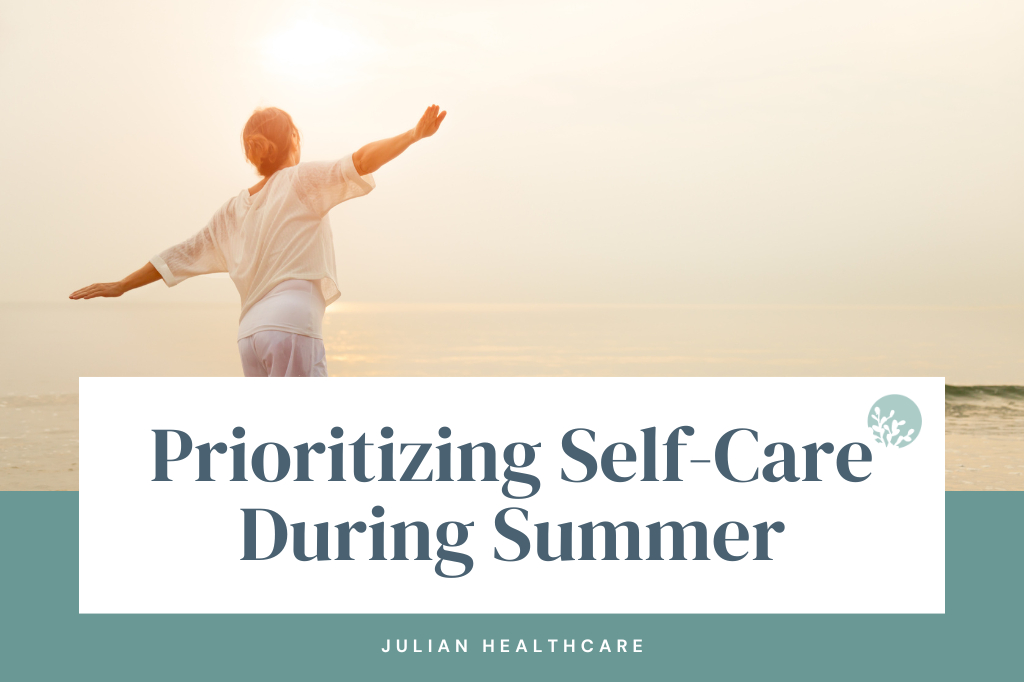Summer is often viewed as a time for relaxation and fun, but for many caregivers, especially moms, it can be a season of increased stress and self-neglect. We see it every summer in our clinic. With kids home from school, disrupted routines, family vacations to plan, children’s summer activities to get them to and from, and the constant demand to focus on others, prioritizing self-care often gets neglected. The stress of the demands of summer often leads to an increase in symptoms in many women.
The Impact of Not Prioritizing Self-Care
When stress levels rise, our bodies respond by producing more adrenal stress hormones like cortisol. While this response is natural, chronic elevation of these hormones can amplify existing hormone imbalances and contribute to new deficiencies, affecting sex hormones and thyroid function. This imbalance can manifest in various ways, including:
- Anxiety
- Insomnia
- Fatigue or Exhaustion
- Muscle/Joint Aches and Pain
- Weight Gain
- Food Cravings
- Period Irregularities
- Burnout
- Irritability
- Brain Fog
Beyond these immediate symptoms, hormone deficiencies can lead to more serious long-term health issues that we may not feel immediately. Things such as increased bone breakdown, higher risk of heart attacks, increased risk of dementia, and more.
Practical Tips for Prioritizing Self-Care This Summer
- Prioritize Sleep: Ensure you are getting adequate rest. Create a calming bedtime routine and maintain a regular sleep schedule.
- Balanced Diet: Focus on nutritious foods that support hormone balance, such as protein, healthy fats, and organic produce. Limit sugar and caffeine intake.
- Regular Exercise: Engage in physical activities that you enjoy. Exercise can help manage stress and improve mood.
- Mindfulness and Relaxation: Practice mindfulness techniques like meditation, yoga, or deep-breathing exercises to help reduce stress levels.
- Stay Hydrated: Drink plenty of water throughout the day. Dehydration can exacerbate symptoms of fatigue and irritability.
- Social Support: Don’t hesitate to seek support from friends, family, or support groups. Sharing your experiences can help alleviate feelings of isolation.
- Schedule Downtime: Make sure to carve out time for yourself. Whether it’s reading a book, taking a bath, or simply sitting quietly, personal time is crucial.
- Delegate. You don’t have to take it all on yourself. Assign age appropriate tasks to your children and ask your spouse to pitch in if they don’t already. Don’t be afraid to outsource housecleaning, childcare, meal prep, etc. to professionals if your resources allow it.
- Professional Help: If stress and hormone imbalance symptoms become overwhelming, schedule an appointment with Julian Healthcare. We can offer advice, support, and potential treatments to help manage your symptoms.
Vagus Nerve Stimulation for Self-Care
Vagus nerve stimulation offers significant benefits for stress management by enhancing the parasympathetic nervous system’s activity, which promotes relaxation and reduces the physiological impacts of stress. Stimulating the vagus nerve helps individuals better cope with anxiety and stress-related disorders. There are many ways you can stimulate your vagus nerve throughout the day. Some of the strategies you can try include laughing, deep breathing, humming, splashing cold water on your face, or gargling water.
We also highly recommend VeRelief, a new and innovative technology designed to stimulate the Auricular Branch of the Vagus Nerve and the Great Auricular Nerve located just beneath the ear. These specific nerves are essential for calming the “Fight, Flight, or Freeze” response in the nervous system. When you’re feeling stressed, anxious, or overwhelmed, vagus nerve stimulation with VeRelief is a quick way to achieve calmness.
You can learn more about this new technology here. We are now offering the use of these headphones in our office for our patients in 10-minute sessions. You can schedule your session here (look for the VeRelief option)!
Show Up Fully for Yourself
As moms, we grow used to taking care of everything for everyone else. Taking care of yourself is not a luxury though; it’s a necessity, especially during the busy summer months. By understanding the impact of stress and hormone imbalances and implementing practical self-care strategies, caregivers can better manage their well-being and enjoy the season. Remember, self-care is the foundation that allows you to care for others effectively. Prioritize your health, and you’ll be able to show up fully for yourself and your family!



